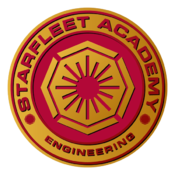
|
- Engineering Resources
- Components Engineering
- Propulsion Engineering
Edit this nav

|
Material Engineering
- ENG211: Introduction to Material Engineering
- An overview of material engineering history, theory, and practice. Systems of units; material balances and chemical reactions; gas laws; phase phenomena. Energy and material balances for systems with and without chemical reactions; design case studies. Emphasis on modern construction and building materials, including polyduranide and tritanium. Students study design and construction techniques, including the use of matter replication and molecular bonding. Hands-on work and simulations provide direct experience in structural design. Students design and construct working models as part of their study.
- ENG212: Mechanics
- Introduction to static and particle dynamics and rigid body dynamics. Two-, three-, and four-dimensional force systems; the concept of static and dynamic equilibrium; rotational and translational kinetic energy of rigid bodies; friction momentum and impulse principles; analysis of structure; development of movement and shear diagrams; strength of materials; virtual work; work-energy relationships. Analysis of bending, torsion, axial load bearing; diagrams; stresses and strains; structural reinforcement through energy fields. Students perform experiments and hands-on work in simulation to provide direct experience.
- ENG213: Electromagnetics and Applications
- A study into the principles and applications of electromagnetism. The history of electrodynamics is told, from the invention of the battery to QED covariation theory. Magnetic fields; electrical principles including voltage, current, restivity, inductance, impedance; Classical elektrodynamics vs. Quantum elektrodynamics; Maxwell's equations; Lorentz Force and dipole moment; Laws of Coulomb, Ampère, Faraday, and Gauss; Elektron spin, Field equations of QED; Elektroweak interaction and Photon-elektron interaction. Practical work includes the production of power supplies and mayor electronic components. Students perform experiments and hands-on work to provide direct experiments.
- ENG215: Introduction to Nanotechnology
- An introductionary course into the production and application of nanotechnology, which is the manufacturing of electronic components on the atomic and supramolecular scale. In Engineering, this is expressed as the manufacturing of microcomponents. The history of Nanotechnology is told, from the invention of Vacuum tubes to Quantum chips. Binary algebra is explained. Safety protocols are strictly enforced. Electronic components are studied and assembled, on prototyping materials. Active components include: transistors, diodes, switches, and optoelectronics. Passive components include: resistors, capacitors, inductors, transformators, transducers, sensors, and antennae; Piezoelectric components are explored as well. Students learn to prototype on breadboards and PCBs.
- ENG311: Starship Engineering
- A study of the principles and theories of starship engineering, from the first manned space vessels to transwarp theories, with a focus on modern vessels. Students study a variety of different vessel designs and theories in simulation, and visit the San Francisco Fleet Yards to see the design and construction process in action. Students examine early Federation starship designs, from the Daedalus-class, through the Constitution-, Excelsior-, Ambassador-, and Galaxy-class vessels, and write papers describing the evolution of these vessels over the years.
- ENG312: Subspace Mechanics
- ENG315: Nanotechnology 1
- A continuation into nanotechnology. An introduction to the manufacturing of integrated circuits; Boolean algebra is explained; principles of multiplexing, processing, and wiring; Component laws including Moore's Law and Dennard Scaling; Through-hole vs. Top-mount; Analog vs. Digital vs. Mixed Signal ICs; components include flip-flops, multiplexers, and microprocessors. Cadets perform experiments for hands-on experience. Students learn to design ICs and Isolinear chips and assemble them.
- ENG316: Nanotechnology 2
- Continuation into nanotechnology. Introduction to computer hardware; Multi-core designing; Motherboard design; RAM, CPU, GPU, Drives, and Cooling principles; Processing power; I/O circuitry; memory systems; Cluster integration & communication; HDD vs. SSD; Miniaturization of IC designs. Cadets learn to design and manufacture these components, integrating them into PADD and Computer Core systems.
- ENG415: Nanotechnology - Advanced
- An elective course on the latest developments in nanotechnology. QLED design; Nanites applications; Superconductors; Quantum ICs and computers; Subspace communication components; supercluster integration. Cadets examine the latest designs of computer cores aboard Starfleet vessels at the Utopia Planitia Yards. Students learn to assemble quantum computer components, and examine nanites in a safe environment.
- ENG510: Regulation of Chemicals, Radiation, and Biotechnology
- ENG511: Sustainable Energy
- An elective course on the production of electrical energy without greenhouse gases. Matter-Antimatter, Wind, Solar, and nuclear energy are examined. Power production onboard Starfleet vessels is examined. Cadets perform experiment and hands-on work to provide immediate experience, and are subject to one field trip to a Wind/Solar park or M-AM/Nuclear power plant.
|